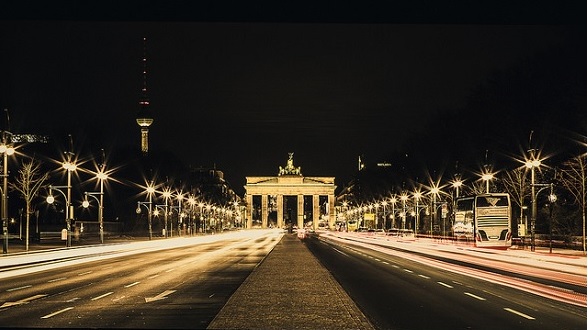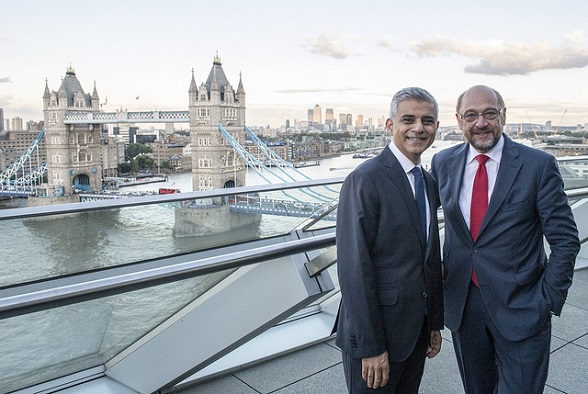Just after coming back from her holidays on the Swiss Alps Theresa May set up a meeting with her cabinet to discuss Brexit. She knew all eyes were on her so she took the opportunity to establish then that immigration control, not the single market, will be the main priority for negotiating the terms of Brexit, that there won’t be another referendum, that the UK won’t stay in the EU through the back door and she repeated her motto once more.
Three days before these harsh statements I was arriving in Berlin.
It was quite late and I was exhausted from the week that had just passed. I got to the hotel, crashed on the bed and the next morning I was woken up by a text from a friend: “Villalobos is playing, head down!” I instantly felt nostalgic. It’s not only the oppressive concrete, wide avenues and long distances that resemble my hometown. It’s also the vibe and people’s commitment to hedonism. I felt in love with Berlin the first time I visited in 2008. It seemed to be a better version of Sao Paulo in every way. I was on my third year at university and I made plans to move there as soon as I finished it. There were complications on the way and obscure motivations that led me to move to Milan instead. Amongst them was a bizarre sense of belonging and the fact that Italy was the only European country that recognized my blood right to citizenship.
I learn later that the romantic idea people from Sao Paulo have of Italy is only a distorted self-reflection of ourselves and one day I woke up and realized it made no sense at all for me to be living in Milan. So I decided to quit the second bachelor degree I was taking and move away. Berlin was my first choice but I could only find a postgraduate course in Music Industry Management in London.
This very idea of free movement and endless possibilities is what seduced me to come to Europe in the first place but it’s also true that the idea I had of the European project was completely different back then, maybe it was a romantic idea too. I used to see the EU more like a supranational entity promoting cooperation between countries than as a bullheaded neoliberal institution. Of course, this was before the complete failure of the austerity measures the European Central Bank imposed to the countries that were heavily indebted to it, before the rise of Euroscepticism along with retro nationalism and before the lack of accountability and transparency of the EU institutions became a problem.

Three months on from the referendum, May still refuses to give any assurance to European citizens about their right to remain in the UK, this includes parents who had their children in this country but are not nationals. Her two main concerns are about a big influx of EU immigrants coming all at once to the UK so they are able to guarantee access to benefits and the right to live and work indefinitely, and about British citizens living in Europe being unable to retain the same rights on those countries.
Perhaps her latter concern makes a bit of sense. Of all the EU countries, Britain is the one with most of its nationals living overseas. Not only that, the Brits claim way more benefits on these countries than their respective citizens do in the UK. Nonetheless, allowing Brits to stay doesn’t seem to be an issue for any of them, Germany is even considering offering them automatic citizenships.
But regarding her former concern, George Osborne, the ex-chancellor, made a statement last year saying that the UK would need 1 million people to immigrate by 2020 to keep its rate of growth. A number of reports also show that EU citizens in the UK pay more taxes than they claim on benefits and this includes European citizens who were born overseas like myself. Could it just be possible that immigration was never a real problem on the first place? The Liberal Democrats, who propped up a Tory government in 2010 by forming a coalition with them, recently came out and accused Theresa May of tampering with a report from 2014 about the pros and cons of EU membership in what concerned immigration. In my view, she was trying to push for a “better” deal with Europe back then. May painted a picture where immigrants are like parasite insects flying towards the light, and where the UK is the brightest light. This makes absolutely no sense. If I take myself back to 2010 when I made the decision to move to London and add the Brexit factor to it I would have definitely chosen Berlin. Even if I didn’t plan to stay in the UK at the time I would like to have that option. I’d also wonder where a UK diploma would get me in a couple of years if the UK ended up all alone outside the EU. And even if the situation was completely different and I was looking for a random job or to do “benefit tourism”, taking into account the cost of living and the £75 a week in benefits the government might give me or not, I can think of a few other European countries where I would be much better off than in the UK.

When I first read that the Prime Minister had set xenophobia and racism instead of the economy as the top priority for the Brexit negotiations I was convinced she was so out of touch with reality and actually incapable to think even remotely as “the other”, something Hannah Arendt defines as “banal”. However, it’s been almost a month since that meeting and all the attempts the trade secretary, Liam Fox, the Brexit secretary David Davis and the foreign secretary Boris Johnson made to define what Brexit means were completely disavowed by May. According to her, these were only the Ministers’ own views. Everything related to triggering article 50 is still at square one and perhaps it will stay there forever since there is no way to leave the EU without badly harming the economy and because the reckless promises the leave camp made before the referendum are impossible to keep owing to the facts that the EU would never accept those terms, that many statistics were manipulated and that there isn’t a single country in the world willing to make a deal with the UK that would harms its relationship with the EU. I now think she’s just making empty populist speeches, nonetheless, these speeches can be very harmful to the UK.
For months now Frankfurt has been making a case for corporations to leave the UK and move there. Weeks ago buses were riding across London inviting start ups to move to Berlin. As a matter of fact, Berlin is taking every chance to position itself as a welcoming place to the same people May is trying to repel. I have to say, it’s tempting, and perhaps if they gave a substantial financial incentive to my startup and the German banks weren’t refusing any personal credit for UK residents because of Brexit I would have moved there already, though I’d still rather stay in the UK.
This very idea of free movement and endless possibilities is what seduced me to come to Europe in the first place, but it’s also true that the idea I had of the European project was completely different back then – maybe it was a romantic idea too
I’ve been living for almost 6 years in London and working in the cultural industries all this time and I now have a different perspective about Berlin than I did in 2010. Both film and music industries are much less developed in Germany and they are heavily influenced by the UK and the US. There is also only a fraction of the London startups, tech and innovation enterprises in Berlin, but it’s not only that, I see the UK as a much more diverse country than Germany and London as having more cultures integrated than Berlin. This all may go to waste with Brexit of course but for me, personally, there’s no better place to be right now than the UK.
On the past decade almost half of the music venues closed down while artist and creatives are being pushed away from the city due to rising rent prices and cost of living. It took centuries for London to become the complex diverse and opened society it is today but for years now there has been a constant trend to turn it into a homogenized financial center. The City of London is expanding towards the outer city by gentrifying it and converting it into its own suburbs.
If a ‘hard’ Brexit really happens, London will lose it’s status as the financial center of Europe and most of the sector will just move somewhere else, take the city boys with it and we’ll be left with the remains of what it once was. This is the other side of Brexit, it would bar this sort of gentrification and the government could restructure its investments away from the financial sector, a lot of those corporations don’t pay much tax in this country anyway. This could be particularly beneficial at a time when Sadiq Khan, the Mayor of London, is committed to developing a night time economy and protecting the local entertainment industry. The stakes are too high though and it would be very selfish of me to support Brexit because of that. Besides, I don’t think the UK will ever leave the single market. It may make a new, worse, agreement with the EU and lose its place on the table, but really, I don’t believe xenophobia will be really prioritized over the economy other than during populist speeches. There’s also a chance the high court will rule that only the Parliament can trigger Article 50, or that the EU will change substantially after the German and French elections next year. Sarkozy at least has promised it would if he wins.





